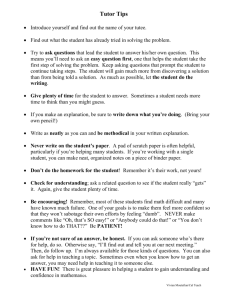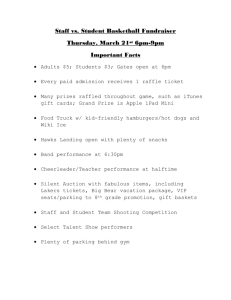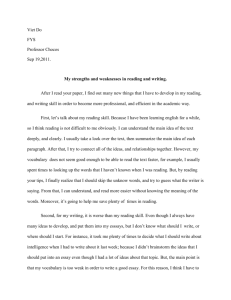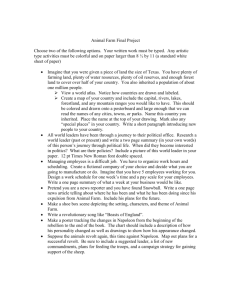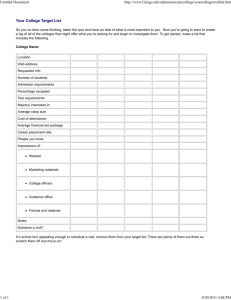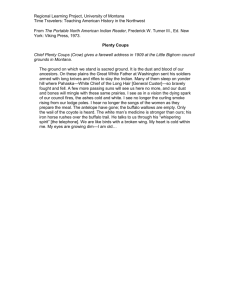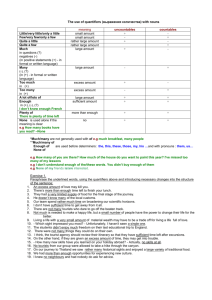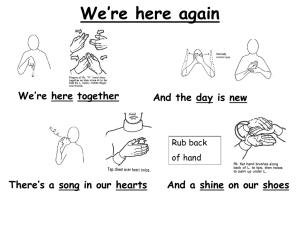Some Thoughts on a lot of - Soka University Repository
advertisement
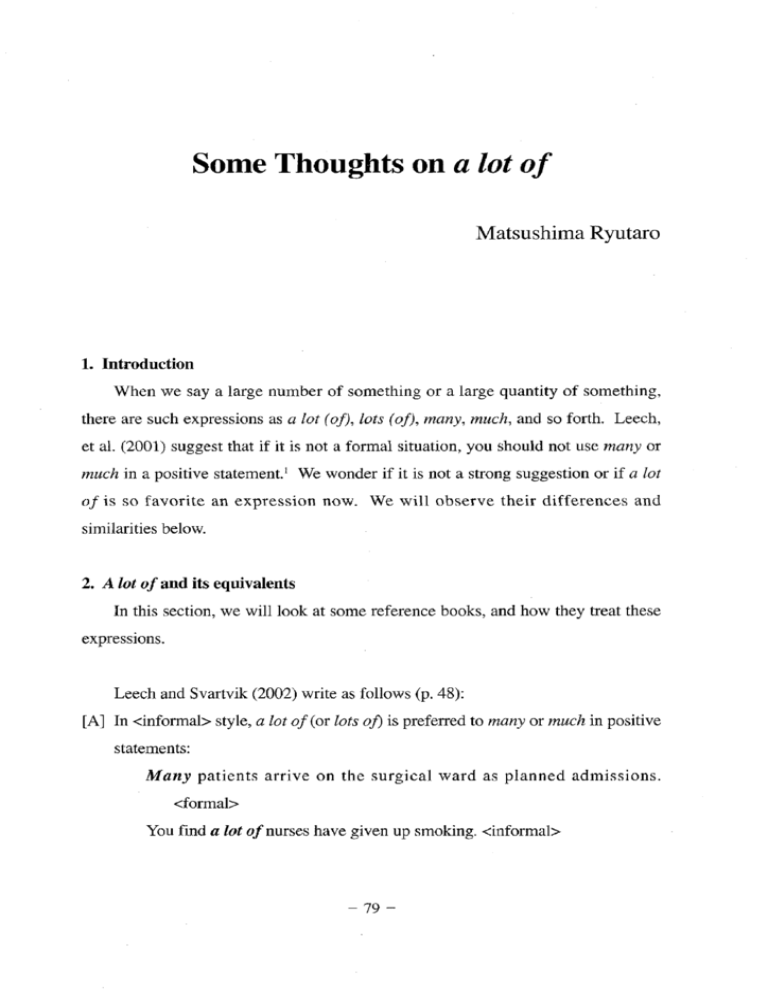
Some Thoughts on a lot of Matsushima Ryutaro 1. Introduction When we say a large number of something or a large quantity of something, there are such expressions as a lot (of), lots (of), many, much, and so forth. Leech, et al. (2001) suggest that if it is not a formal situation, you should not use many or much in a positive statement.' of is so favorite We wonder if it is not a strong suggestion or if a lot an expression now. We will observe their differences and similarities below. 2. A lot of and its equivalents In this section, we will look at some reference books, and how they treat these expressions. Leech and Svartvik (2002) write as follows (p. 48): [A] In <informal> style, a lot of (or lots of) is preferred to many or much in positive statements: Many patients arrive on the surgical ward as planned <formal> You find a lot of nurses have given up smoking. <informal> — 79 — admissions. There's lots of spare time if you need it. But in questions and after negatives (very) many and much are not restricted to <formal> English: Have you seen much of Julie recently? I don't eat much in the mornings. Do many people attend the meetings? We don't get many visitors in the winter. Quirk, et al. (1985) also talk about a preference as follows (pp. 384-385): [B] Much and, to a lesser extent, many have acquired some nonassertive force (cf 10.61 Note [b]), with the result that they are rarely used, at least in informal English, without some negative or interrogative implication. are uncharacteristic Sentences like [1] of modern idiomatic English, and there is a preference for open-class quantifiers such as a great deal (of), as in [la]: ?much.[1] We have endured a great deal.[la] Similarly, rather than [2] with many, informal English shows a preference for [2a] with plenty of and a lot of (cf 5.25): many good ideas. She has [2] [2a] plenty of a lot of good ideas. Leech, et al. (2001) say many and much "should follow an adverb of degree such as AS, HOW,SO,TOO,(VERY)"and cite these examples (s.v. many & much): [C] `How many wine glasses did you bring?' `As many as I could.' 'I've never seen so many people in one car!' `Yes , there are far too many for safety.' `I've never seen so much traffic on this road .' `I know. There's far too much. — 80 — It's dangerous for children.' Huddlestone and Pullum (2002) note partitiveness and non-partitiveness as follows (p. 349): The obliques' may be either partitive [D] [54] or non-partitive: i [A lot of the delegates] complained. ii [A lot of people] complained. [partitive] [non-partitive] In [i] the whole NP picks out a subset of the set referred to by the delegates, whereas there is no such subset relation involved in [ii]. The partitive obliques are normally definite and are distinguished from the non-partitives in that they occur in the fused-head construction: [55] i [Many of the delegates] complained. ii *[Many of delegates] complained. [partitive] [non-partitive] Instead of [55ii] we have simply [Many delegates] complained, where there is no embedding of one NP within another. Biber, et al. (1999) give a table of "Distribution occurrences of individual quantifiers; per million words" (p. 278) and show that per million words many occurs 400 (coNV), 400 (FIcT), 600 (NEws) and 1000 (ACAD),much occurs 600 (coNV), 400 (FIcT), 200 (NEws) and 200 (ACAD),and a lot of occurs 400 (coNV), 200 (FIcT), 200 (NEws) and less than 100 (ACAD). Thus in academic writing a lot of is rare and many is much preferred. 3. Instances of a lot of, lots of, and plenty of In this section we will look at a lot of and its equivalents in writing and see how they are used. The books where we look for them are one American story (the first book of the Roswell High series), one British novel (the first book of the Harry Potter series), and one academic writing (Double Vision). — 81 — The examples which contain a lot of will be cited. Each example has [U or C] and [N or S] in the brackets at the end of it. The symbol [U] means that the noun phrase that follows a lot of is an uncountable noun and in singular, and [C] means that the noun phrase that follows a lot of is a countable noun and in plural. The symbol [N] means that the example occurs in the narrative, not in direct speech, and [S] means that the sentence is in direct speech. Thus, [U or C, N or S]. The number of the instances of each item will be given. 3a. Roswell Here are the instances of a lot of: 4 (1) "It would take a lot of practice," Maria complained. [U, S] (2) A lot of people talked about who they would clone if they could-----scientists or athletes or movie stars. [C, N] (3) Michael was right. Healing Liz would attract attention-----a lot of attention. [U, N] (4) I know it looks like blood, like a lot of blood .... [U, S] (5) And there is blood under the ketchup, a lot of blood, she thought. (6) One of them had used a lot of power----healing, [U, N] dream walking, something. [U, N] (7) "Liz is going to have a lot of questions," Michael cut in. [C, S] (8) They had covered a lot of ground over the years. [U, N] (9) Each orb gave off one pure note of music, and Isabel had spent a lot of hours matching up the people she knew with the sound of their dream orb. (10) But my parents are always bringing home books----a some medical books and stuff. [C, N] lot of their law books, [C, S] (11) He knew it was normal for Liz to have a lot of questions, but he was starting to feel like some kind of freak. [C, N] (12) When we got older, we spent a lot of time talking, — 82 — trying to remember everything we possibly could. [U, S] (13) "You have a lot of confidence in Liz," Isabel said. [U, S] (14) There are a lot of veins and arteries in the throat, and you're not even bleeding. [C, S] There are fourteen examples of a lot of. The number of [U] is eight, and the number of [CI is six. The numbers are nearly the same. The number of [NI is seven, and the number of [S] is seven. The numbers are the same. There are four [U, S]'s, three [C, S]'s, four [U, N]'s, and three [C, NJ's. 3b. Potter 5 Here are the instances of a lot of: (15) As he sat in the usual morning traffic jam, he couldn't help noticing that there seemed to be a lot of strangely dressed people about. [C, N] (16) Owls ... shooting stars ... and there were a lot of funny-looking people in town today ... [C, S] (17) He wore round glasses held together with a lot of Sellotape because of all the times Dudley had punched him on the nose. [U, N] (18) The boat Uncle Vernon had hired was still there, with a lot of water in the bottom after the storm. [U, N] (19) A lot of green smoke came billowing out, and as it cleared, Harry gasped. [U, N] (20) Everyone says Hufflepuff are a lot o' duffers, but-----6 [C, S] (21) Harry felt strangely as though he had entered a very strict library; he swallowed a lot of new questions which had just occurred to him and looked instead at the thousands of narrow boxes piled neatly right up to the ceiling. [C, N] (22) He was starting to attract a lot of funny looks, because of Hedwig. (23) Well----I remember a lot of green light, but nothing else. (24) After making a lot of complicated [C, N] [U, S] notes, they were each given a match and — 83 — started trying to turn it into a needle. [C, N] (25) In the meantime, Harry filled Ron in about the package that seemed to have been moved from Gringotts to Hogwarts, and they spent a lot of time wondering what could possibly need such heavy protection. [U, N] (26) Harry had a lot of trouble keeping his mind on his lessons that day. [U, N] (27) That'll take a lot of explaining. [U, S] (28) It's not that unusual, yeh get a lot o' funny folk in the Hog's Head----that's pub down in the village. the [C, S] (29) A lot of the greatest wizards haven't got an ounce of logic, they'd be stuck in here for ever. [C, S] (30) I'm going to have a lot of fun with Dudley this summer ... [U, S] There are sixteen examples of a lot of. The number of [U] is eight, and the number of [C] is eight. The numbers are the same. The number of [N] is nine, and the number of [S] is seven. The numbers are almost the same. There are three [U, S]'s, four [C, S]'s, five [U, N]'s, and four [C, N]'s. Here are the instances of lots of: (31) He was sure there were lots of people called Potter who had a son called Harry. [C, N] (32) Ten years ago, there had been lots of pictures of what looked like a large pink beach ball wearing different-coloured bobble hats----but was no longer a baby, and now the photographs riding his first bicycle, on a roundabout Dudley Dursley showed a large, blond boy at the fair, playing a computer game with his father, being hugged and kissed by his mother. • [C, N] (33) She had a bossy sort of voice, lots of bushy brown hair and rather large front teeth. [U, N] (34) Lots of people had come from Muggle families and, like him, hadn't had any idea that they were witches and wizards. [C, N] (35) `He's got lots o' rats an' some brandy fer the journey,' said Hagrid in a muffled — 84 — voice. [C, S] There are three [C, N]'s, one [C, S], and one [U, N], but no [U, S]. ' Here is the instance of plenty of: (36) Plenty of courage, I see. [U, S] Only one instance of plenty of is found here. 3c. Double Vision' There are no instances of a lot of or lots of, but one instance of plenty of is found as follows: (37) When we encounter a quite .different vision in, say, a Buddhist, a Jew, a Confucian, an atheist, or whatever, there can still be what is called dialogue, and mutual understanding, based on a sense that there is plenty of room in the mind of God for us both. [U] This book is academic and formal. Many and much are likely and expected to be used. It is not surprising that there are no instances of a lot of or lots of. Thus it is interesting that there is an instance of plenty of here. 3d. The number The following of the instances table shows the number of the instances of each item book. Roswell a lot of Double Potter Vision Total 14 16 0 30 a lot 7 20 0 27 lots of 0 5 0 5 lots 0 3 0 3 0 1 1 2 0 0 0 0 many 14 25 27 66 much 48 74 28 150 plenty of plenty many of 0 2 5 7 much of 0 2 4 6 - 85 - in each 4. Conclusion When we look at the table above, we notice that the number of plenty of and plenty is very small. There is no example of plenty and there are only two examples of plenty of. The number of lots of and lots is rather small, too; only eight in total. Besides, they appear in one book only. It's quite understandable that in Double Vision there are no examples of a lot of, a lot, lots of, and lots, because the book is an academic writing. Thus it is interesting that there is one example of plenty of in it. NOTES ' S .v. a lot (of), lots (of), or many, or much. 2 Huddlestone and Pullum (2002) call the noun phrase that follows a lot of the oblique: "what we shall call the oblique, the NP complement of of" (p. 349). 3 Metz (1998) . 4 All the underlining in the instances quoted below is mine . 5 Rowling (1997). 6 The examples (20) and (28) are spoken by Hagrid ' There are three instances of lots , who talks in his own dialect, and so of becomes o'. , which are cited here: (a) `It's gettin' late and we've got lots ter do tomorrow,' said Hagrid loudly. (b) Best be off, Harry, lots ter do today, gotta get up ter London an' buy all yer stuff fer school. (c) Must get on lots ter buy. It is interesting that all these three are spoken by Rubeus Hagrid, Keeper of Keys and Grounds at Hogwarts, who speaks in his own dialect, and so to becomes ter in his speech. 8 Frye (1991). BIBLIOGRAPHY Biber, Douglas, and Stig Johansson, Geoffrey Leech, Susan Conrad and Edward Finegan. 1999. Longman Grammar of Spoken and. Written English. Longman. Frye, Northrop. 1991. The Double Vision: Language and Meaning in Religion. University of Toronto Press. Huddleston, Rodney and Geoffrey K. Pullum. 2002. The Cambridge Grammar of the English Language. Cambridge: Cambridge University Press. Leech, Geoffrey, Benita Cruickshank and Roz Ivanic. 2001. An A-Z of English Grammar & Usage, the second edition. Longman. Leech, Geoffrey and Jan Svartvik. 2002. A Communicative Grammar of English, the third edition. — 86 -- Longman. Metz, McIinda. 1998. Roswell High: The Outsider. New York: Pocket Pulse. Quirk, Randolph, Sidney Greenbaum, Geoffrey Leech and Jan Svartvik. 1985. A Compreh ensive of the English Language. London: Longman. Rowling, Joanne K. 1997. Harry Potter and the Philosopher's Stone. London: Bloomsbury. - 87 - Grammar
